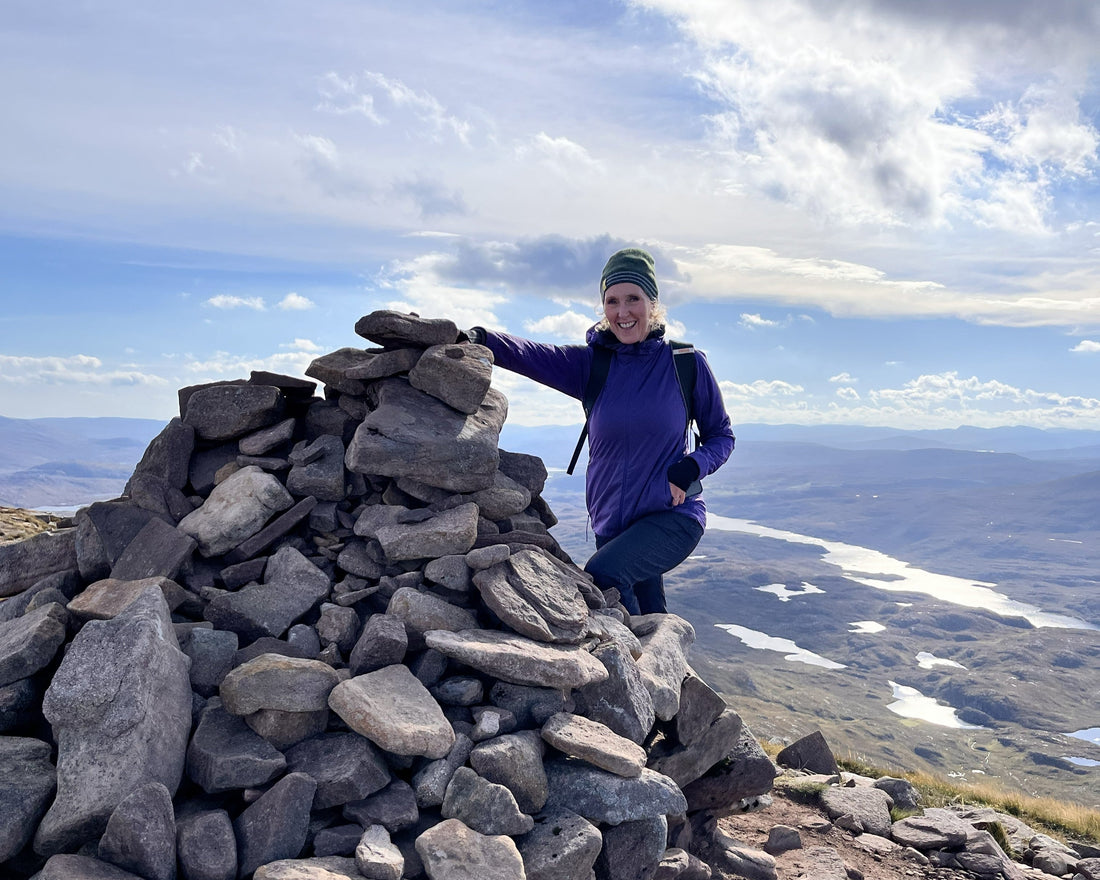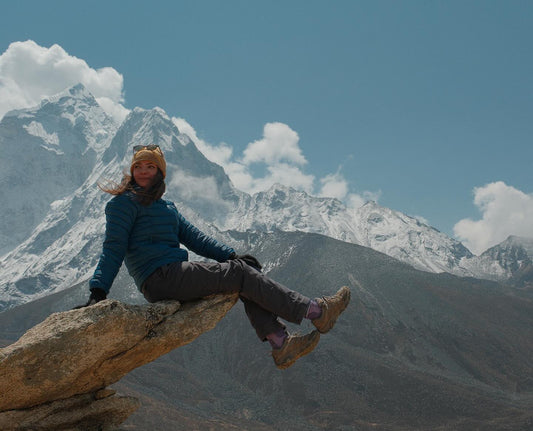By Alex Feechan
As an entrepreneur and founder, resilience is something I think about a lot. Over the years, I’ve often been described as resilient, and I suppose that comes from having weathered my fair share of challenges, both in business and in life. It’s a word we hear often, particularly in the world of entrepreneurship, but what does it really mean? Is resilience about toughness, persistence, or simply refusing to give up? For me, resilience isn’t about being unshakeable. In fact, I think being vulnerable and open helps to build true resilience. It’s about how you respond when things get hard, when plans unravel, and when the challenges keep coming. It’s about staying focused, grounded, and hopeful, even when the path ahead isn’t yet clear.
So when I was invited to join a Resilient Leadership Expedition in Assynt, in the northwest corner of Scotland, it felt like the perfect opportunity to explore that question in a new way, out in the wild, surrounded by nature. The invitation came from David Gaffney and Malcolm Robertson of Charlotte Street Partners, who were running the expedition in partnership with Ocean Vertical, a brilliant adventure company that helps people reconnect with the outdoors. It promised three days of hiking, reflection, and conversation, all set in one of the most breathtaking landscapes in Scotland.

It couldn’t have come at a better time. After an intense period in the business, I knew I needed some space, time away from the constant doing to pause, reflect, and get perspective. The chance to do that in the Highlands, surrounded by fellow business leaders and entrepreneurs, felt like something I couldn’t turn down.
Arriving in Assynt
We met in Ullapool for lunch, a group of leaders and founders from different industries, brought together by a shared curiosity about what resilience in leadership truly means. The weather was on our side: clear skies, sunshine, and a light breeze. There was a palpable sense of anticipation as we tucked into lunch, chatting about the adventure ahead.
Before heading north, we made a quick stop in Lochinver to stock up on the famous Lochinver pies, the perfect summit treat, we were told! Then it was onwards to Achmelvich Beach, our base for the next two nights.

If you’ve never been, Achmelvich feels like a little piece of heaven. A sweep of white sand and turquoise water framed by rugged rocks and moorland.

The Achmelvich Beach Youth Hostel sits right above the bay, simple but welcoming, with warm showers, a wood-burning stove, and views that make you stop and breathe.

After settling in, we set out for our first walk, scrambling across the rocks to find The Hermit’s Castle, a tiny, monastic-style concrete structure tucked into the cliffs above the sea. Built in the 1950s by architect David Scott, the castle is thought to be one of Britain’s smallest, a curious and solitary monument looking out over the bay. As we clambered over the rocks, the late-afternoon light reflected off the stone and water, and the air was filled with sea spray and the sound of waves, a beautiful backdrop to this intriguing little cave.

Gathered around the strange little building, we could see the west face of Suilven in the distance, an imposing, dome-shaped peak rising from the landscape. Stevie Boyle from Ocean Vertical talked us through what lay ahead: our goal to climb Suilven, one of Scotland’s most recognisable mountains, rising abruptly from the surrounding moorlands like a sleeping giant. Its steep sides and long ridge looked magnificent, and from where we stood, more than a little intimidating.
As I stood there, looking across at the mighty Suilven and thinking about the task ahead, I began to hear some familiar, nagging doubts creep in. Could I actually climb that mountain? Would I be fit enough, strong enough? Would I hold others back? Was I fooling myself, had I yet again over-stretched myself?

Mollie Hughes, from Ocean Vertical and world-record-breaking mountaineer, polar explorer, and all-round inspiration, has achieved incredible feats of endurance and resilience. She was the youngest woman in the world to climb Mount Everest from both the north and south sides and later became the youngest woman to ski solo to the South Pole. Mollie shared with us one of her most personal stories from that Antarctic expedition, when, after weeks of isolation, she found herself battling a wave of negative thoughts and self-doubt.

She described how, despite her physical strength, it was her mindset that began to falter. Alone in one of the most hostile environments on earth, she realised that to survive and succeed, she had to change the narrative in her own head. Drawing on the power of positive affirmations, she began repeating simple phrases out loud into the vast Antarctic silence: “I am strong. I am inspiring people. I am a f***ing badass.” It felt awkward at first, but soon she felt a shift. Her energy lifted, her confidence returned, and her focus sharpened. It was a powerful reminder that our minds can be our greatest allies or our toughest opponents, and that resilience often starts with the words we say to ourselves.
Listening to her, I realised that the uncertainty I felt looking at Suilven wasn’t so different from the uncertainty I often feel in business. You can’t always see the path ahead, but you have to trust that by putting one foot in front of the other, you’ll find a way.

That evening, under a sky filled with stars, we gathered round a small fire on the beach, sharing a wee dram as we all reflected on the day ahead. The conversation turned to resilience. One of the group asked, “Is resilience the same as stubbornness?”
It’s a good question. For me, stubbornness feels too rigid. Resilience, especially in business, is about the ability to be flexible, to understand that things don’t always work out as planned but that there’s always something to learn from the challenges we face. It’s about adapting, adjusting, and finding a way forward. Like the great oak tree, we must be rooted and grounded, but able to bend and sway when the storms come, confident in the knowledge that our foundations are strong enough to support us through difficult times.
The Climb to Suilven
The next morning, we were up early, boots on, backpacks packed, and in the van by 7am. The air was crisp, the sky clear, and Suilven loomed on the horizon as we drove towards the start of the trail.
Before you even reach the foot of Suilven, there’s a long, steady walk, nearly two hours across undulating moorland. As I walked, I found myself thinking about the last ten years of building FINDRA. That long approach felt like a metaphor for the entrepreneurial journey, the slow, steady slog of progress, the ups and downs, the twists and turns, the moments when you wonder if you’ll ever reach your goal.

When we finally reached the base of the mountain and looked up, it seemed impossibly steep. But as we began the ascent, step by step, the route unfolded. You focus on the next foothold, the next ridge, the next breath, and somehow, you keep moving upward. It’s exactly like business. You can’t see the whole path, but by keeping your focus, momentum builds, and suddenly you find yourself further than you thought possible.
The reward for the tough climb came as we reached the most prominent part of the ridge, the Bealach Mòr, which means “Great Pass” in Gaelic. Standing there, catching our breath, we looked back at how far we’d come. The view was spectacular, a reminder that progress often feels slow and unseen until you pause and look behind you. From the Bealach Mòr, the final ascent to Suilven’s summit stretched ahead, steeper, rockier, and demanding more effort, but filled with the promise of the view from the top.

As we climbed higher, Stevie talked about “exposure”, the mountaineering term for the feeling of being on a steep, open ridge with a sheer drop on either side. When we reached the spine of Suilven, I understood exactly what he meant. For a few moments, my stomach dropped, and a wave of fear swept over me. But I focused on my breath, steadied my thoughts, and kept going, one step at a time.

When we reached the summit, the view was simply breathtaking. Lochs and hills stretched out for miles under a vast blue sky. The sense of scale and humility was immense. Standing there, eating our Lochinver pies and sharing another wee dram, Dave Gaffney read a few lines from 'On The north side of Suilven' by Norman McCaig. It was a powerful, reflective moment, a reminder of how small we are against the scale of nature, and how important it is to stay grounded.

Lessons from the Descent
As Mollie reminded us before we started our descent, most accidents happen on the way down when you’re tired, relaxed, and less focused. Her words were a metaphor in themselves: in leadership and business, success doesn’t mean the hard work is over. You have to stay mindful, grounded, and deliberate, even when things are going well.
The descent was long, slow, and at times endless. By the time we reached the vans, we’d walked nearly 20 kilometres over eight hours. We were exhausted but exhilarated. Back at Achmelvich, we threw ourselves into the freezing Atlantic for a quick dip, a bracing, life-affirming end to an unforgettable day.

That evening, over dinner, Stevie asked what we’d learned from the experience. For me, the biggest lesson was how the impossible slowly becomes possible, how by taking small, consistent steps, the path eventually reveals itself. The climb was a living metaphor for business and life: resilience isn’t about rushing to the top, it’s about patience, persistence, and faith in the process.
Finding Perspective
On our final morning, we took one last swim in the clear waters of Achmelvich Bay. The cold hit hard, but the feeling afterwards was incredible: calm, awake, and completely alive.
The trip gave me something I hadn’t realised I’d been missing: perspective. The mountains have a way of humbling you, of reminding you that no problem is as big as it feels. When you stand in a landscape like Assynt, surrounded by such vast beauty, you can’t help but see things differently.

Resilience, I’ve learned, isn’t a single trait. It’s a practice, something we nurture by stepping out of our routines, challenging ourselves, and reconnecting with what really matters. Whether in business or in life, it’s about keeping faith, staying present, and remembering that every big climb starts with one small step.
Alex Feechan
Founder & CEO, FINDRA

Images credited to:
Ed Vickers
Malcolm Robertson
Stevie Boyle and Mollie Hughes from Ocean Vertical
Sunday Inspiration
Favourite Book
Breathe: Life Lessons from the Edge of the World - Mollie Hughes
Drawing on her own incredible experiences of extreme adventure and courage, Mollie translates powerful lessons from the wild into everyday life. A true badass and an endless source of inspiration!

Favourite Quote

Favourite Song
Feels like a fitting tune for the wonderful Assynt!


